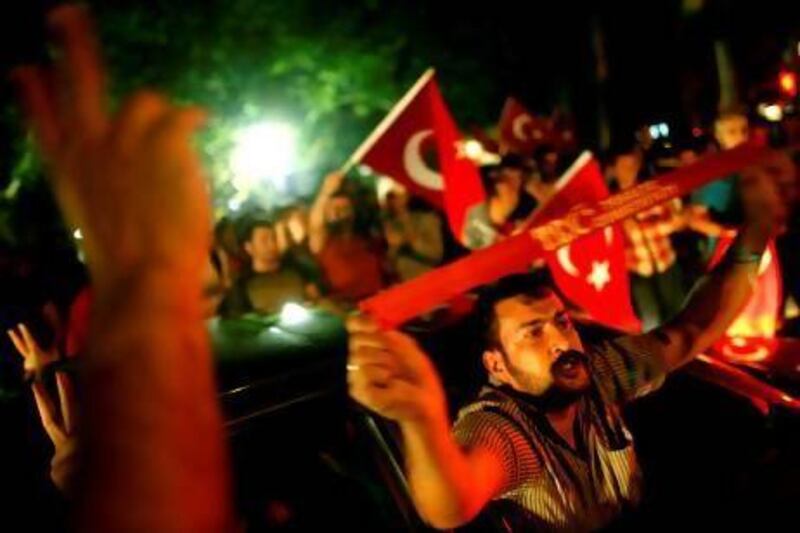ANKARA // Two high-profile Turkish officials have taken a hardline stance against protests that have rocked Turkey for more than two weeks in a move that could advance their political careers, observers said.
Hundreds of thousands of people have taken part in demonstrations that started out as environmental protests but morphed into a wave of resentment towards the perceived authoritarianism by the prime minister, Recep Tayyip Erdogan. The protests have taken place in dozens of cities but the fiercest have been in Istanbul, the country's largest city, and Ankara, the capital.
Ankara's mayor and member of Mr Erdogan's Justice and Development Party (AKP), Melih Gokcek, and the governor of Istanbul, Huseyin Avni Mutlu, are in the spotlight for aggressive tactics used against the demonstrations. In Turkey's major cities, governors are appointed by the prime minister. The protesters have called for both men to resign.
Meanwhile, the mayor of Istanbul, Kadir Topbas, who advocated dialogue with the demonstrators, was sidelined as Mr Erdogan vowed to end the protests and prepared to hold massive rallies in Turkey's two most important cities over the weekend.
The protests may have resurrected Mr Gokcek's career.
Long rumoured to have fallen out of favour with party chiefs over a series of scandals, Mr Gokcek was seen as an unlikely choice by the AKP to run for mayor again in 2014.
But after the protests began on May 31, his connections to nationalist parties made him an important player in efforts to disrupt the protests, said Emre Uslu, a professor of political science at Istanbul's Yeditepe University.
"Melih Gokcek is trying to prevent the nationalist masses from supporting the protesters," Mr Uslu said. "He is dividing the opposition on behalf of the AKP."
Mr Gokcek was also behind a ceremony for Mr Erdogan on the day he returned from North Africa on June 9. The ceremony, attended by tens of thousands, boosted the prime minister's image during the height of the protests.
While Mr Erdogan is still a popular figure, attendance at the event may have been inflated. There were allegations that municipal workers were threatened with the sack if they did not attend the ceremony.
"[Gokcek] was the one that carried all these groups, he was the one that arranged this show of support," said a Turkish journalist who did not want to be named because he worked for a newspaper owned by a government ally. "Most probably Gokcek will keep his place."
Meanwhile in Istanbul, where the protest movement began in Taksim Square's Gezi Park, Mr Mutlu, the governor, has played the role of the AKP's strongman.
While the mayor Mr Topbas, also an AKP member, has distanced himself from Mr Erdogan's plans to develop Taksim, Mr Mutlu ordered police to clear protesters from Taksim Square on Tuesday, prompting clashes that saw hundreds injured.
Major cities in Turkey have governors that are appointed by Ankara. They are in charge of security forces and supposed to stay out of local politics.
Mr Mutlu "is a killer, he lied", said a 45-year-old resident of Istanbul's Beyoglu neighbourhood who has been bringing food to demonstrators in Gezi Park each day. He was referring to Mr Mutlu's decision to use police force after first reaching out to protesters.
Mr Uslu, of Yeditepe University, said Mr Mutlu's loyalty to Mr Erdogan during the protests made him well positioned to become a member of parliament or party official.
"It is typical of Turkish bureaucrats that they would show their loyalty to Erdogan, not the people," Mr Uslu said.






